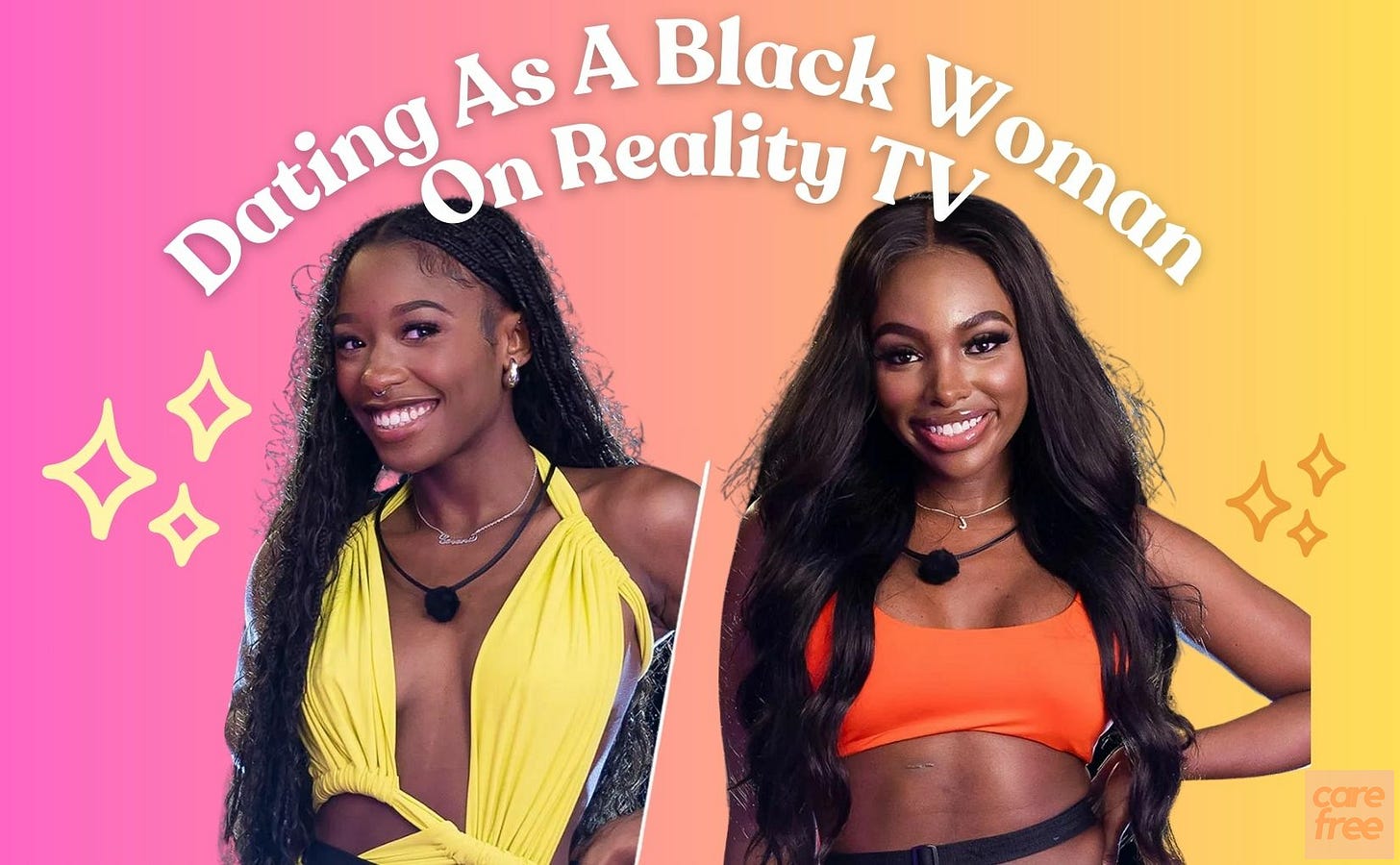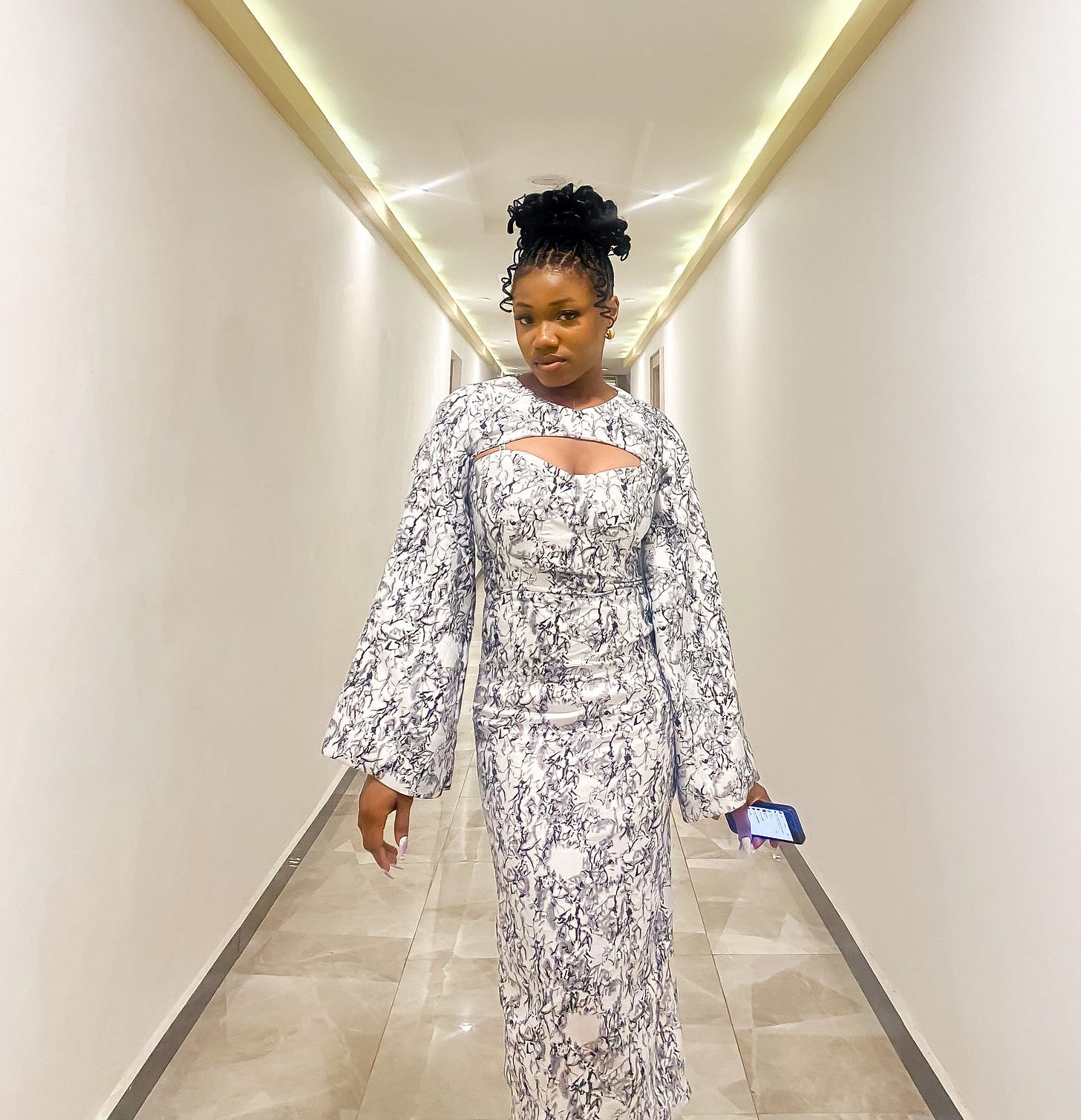Hey yall,
My apologies for last week’s event pump-fake! If you missed it, the event we announced last week is being rescheduled. While it’s not happening in September, I can’t wait to share the details with you again once I have it. I appreciate your continued support even when things don’t go as planned. Such is life!
This Week’s Story
I was gritting my teeth while editing this week’s story. On the one hand, Nigerian-based writer Jessica Onyemauche did such a fantastic job tying in the frustrations of dating in today’s world as a Black woman with the triumph of this season’s Love Island winners in both the US and UK. On the other hand, I’m watching both but I HAVEN’T FINISHED YET! Damn, I am fully spoiled now as to what happens, but I love the outcome, so I guess it’s okay. If you’re still watching finish up, then come back to read this one!
Take care,
Anayo Awuzie
EIC of Carefree Magazine
Why Love Island Is So Significant For Black Women
by Jessica Onyemauche
⚠️ SPOILER ALERT! PROCEED WITH CAUTION IF YOU HAVEN’T FINISHED THE SHOW⚠️
There is no denying that pop culture reflects on society and influences our day-to-day lives more than we like to admit. It has the ability to shape our beliefs and attitudes. The portrayal of larger-than-life characters in films, TV shows, and online can shape our perception of what it means to live a successful, glamorous, and happy life. I grew up seeing the alluring lives of characters on television, from American & British shows to Nollywood movies. This influenced every aspect of my young life: colourism, texturism, wanting to “talk like the whites", abandoning our mother’s tongue, and so much more. Eventually, I grew and I learned. And this has made me continuously insist on representation, specifically healthy representation.
This is why this year’s Love Island seasons in both the UK and US are so important to me, and have been widely celebrated by viewers. A reminder that we have come so far.
Love Island is a dating reality show not just popular within the Black community but is loved by fans across the globe. It was ranked as the number one reality series in the nation across all streaming platforms, according to entertainment data company Luminate.
Dating game shows can be a very different viewing experience for people who are familiar with subtle racism in the dating scene.
In an article for Time magazine titled Love Island USA made me believe in love again, author Taylor Crumpton shares that “Black women are 62% more likely to be unpartnered compared to our male counterparts, according to a 2021 study by Pew Research Center. Societal narratives and tropes about the “Strong Black Woman” have contributed to a belief that Black women are undesirable. What’s more, Black women are considered to be the least desired dating demographic, and also subjected to grotesque racial fetishization online. All to say: dating in the outside world for Black women is hell on earth.”
Calling attention to the couples that made this year’s Love Island extra: Serena Page and Kordell Beckham, and JaNa Craig and Kenny Rodriguez on Love Island USA. Mimi Ngulube and Josh Oyinsan, and Jess Spencer and Ayo Odukoya on Love Island UK.
I spoke with a few fans of the franchise on what the show means to them, and how they feel about finally seeing Black love represented in mainstream reality dating shows. Zarah Elizabeth, an artist, who is an avid watcher of Love Island says, “I know people will say, ‘it’s just reality television, get over it.’ But it’s honestly more than that to me—it’s representation! It’s being able to see yourself in people and see that it’s possible to have Black love. I am a product of Black love, however, my experiences as a Black woman with Black men have been a struggle, at times. We deal with so much: colorism, body shape, what we “bring to the table”, infidelity, the list goes on. The fact that I get to see positive, happy, thriving Black couples on international TV gives me hope, not just for me, but for the future and the younger generation.”
Bonjeh Grace, one of the members of the Love Island community on X that has accumulated more than 29,000 loyalists, continues the discussion by highlighting Serena Paige and Jana Craig, the top contenders of Love Island USA season 6. “Serena felt offended by Kordell’s decision to couple with Daia McGhee and the way she handled the matter earned her the tag ’masculine’ by a few viewers, while the majority sympathized with her. While the situation lingered a bit longer than I expected, her refusal to quickly wrap up her anger strengthened her fanbase because most saw themselves in her.”
“Jana, on the other hand, is the hyper-independent, straightforward, blunt queen,” Grace continues. “She is known for being articulate, expressive, and going for what she wants. She was easily my favorite. She sets the standard and allows the man to move first, and her ability to ask for what she wanted not only rewarded her with the man of her dreams, but a huge number of Jana lovers.”
Despite Serena and Jana wearing the cloak of the “Angry Black Woman,” or simply a Black woman with a mouth—it worked for them. With Serena winning the show and Jana making it to the finals, it's a clear message to Black women that it is okay to express yourself.
Grace answers what made this year's Love Island memorable, “The difference for me was Black love winning. It was seeing women being the ‘villains’ and winning. It was women not suffering before finding love. It was solidarity both for the female Islanders and the audience.”
Beyond “angry” Black women winning in love, Jana Craig and Serena Paige were also a beautiful example of female solidarity and friendship. They made up two-thirds of the trio known as the Powerpuff Girls, or the PPG, which included Leah Kateb. Their trio was an epitome of sisterhood, tomfoolery, and general support for one another—a reminder that love also exists in platonic friendships.
Over the pond to Love Island UK, we also have great examples of Black love this season. During Cinema Night, a fan favourite stir-up that gives Islanders insight into conversations and moments they were not privy to when they happened. A video replayed showing Mimi, despite being Josh’s partner at the time, asking Ayo, her former love interest, to speak to her, and Ayo refused. It was replayed so her current partner Josh would react, however, that wasn't the case. In fact, he defended her. Most fans agree that she was wrong, but Josh didn’t put her down in front of the other Islander. He fought for and supported her. Their entire relationship leaves me in awe. He caters to her in a way that leaves everybody chanting, “God when?” and “God, I’ve seen what you’ve done for others.”
Meanwhile, Jess and Ayo are another lovebirds that had the audience on their toes. Most viewers heavily criticised Ayo for abandoning Mimi for Jess on the Casa Amour recoupling night and this influenced their dislike for Jess and Ayo’s love story. But objectively, Ayo chose Jess and stood on business. I will always love a good boundary setting. Ayo chose Jess and weathered every storm that came with that decision. That’s a commitment I’d definitely want from my partner.
Bidemi, an entrepreneur and student who enjoys the comfort of reality shows when she's not busy, informs us why she is thrilled that Black couples won both the UK and US shows. “Love Island's Black winners defy traditional media portrayals of Black people, showcasing their vulnerability, emotions, and capacity for love. Reality dating shows centre women, weirdly, but it does, and these wins affirm Black women's beauty, worth, and deservingness of love, countering societal biases and prejudices. The show generally highlights love's transformative power and the importance of empathy, understanding, and self-love.”
Gin Lalli, a psychotherapist and author of How to Empty Your Stress Bucket, talks to Carefree about why positive representation is paramount in pop culture. “Shows like Love Island have a powerful influence on viewers, especially those who see aspects of their identity reflected—or not reflected—on screen. For Black women who have historically been underrepresented or stereotypically portrayed in the past, it can have a significant impact on their mental health. Self-esteem and self-perception can be enhanced. It can also reduce feelings of isolation.
“It’s extremely validating because it challenges narrow beauty standards presented in the media and allows for a broader and more inclusive narrative. Where Black women are portrayed as desirable, confident, and multifaceted, it sends a powerful message to viewers.”
Chimamanda Adichie, a Nigerian writer, introduced the notion The Danger of a Single story on a Ted Talk episode. In this episode, she talks about how she was only exposed to white books and, as a result of this thought that only foreigners could exist in books. Upon discovering African books, her narrative shifted. One of the most notable quotes from this speech is “The problem with stereotypes is not that they are untrue, but that they are incomplete. It makes one story become the only story.” This season of Love Island in both the UK and USA combats the single story. It contradicts the narrative that Black love is a struggle, that black women are bitter and angry, and that is something we just have to live with.
Julia Fisher, a mental health professional, warns us against the danger of a single story. “Since Love Island is so popular, people of all races are now being exposed to seeing black joy—something they may not have seen on screens in the past thanks to the narratives Hollywood likes to tell.”
“A single story breeds stereotypes and invalidates a person’s existence, which further leads to feelings of isolation. Most of these feelings can be totally unconscious, and people may not realise they're feeling this way—they just slowly begin to adopt the belief that they're alone,” she concludes.
I hope we get to see more of this. This year’s Love Island seasons are a reminder that there is a reality where Black women can be loved solely for the fact that we are deserving of it, just like everybody else. It's more than people who share the same skin color as me winning. It's seeing women who look like me being treated with so much love and, without hesitation, believing that can be me too.
Jessica Onyemauche is a creative director and a fiction, pop culture, and fashion writer. She's also an avid reader who shares her excitement about her favorite books on Tiktok. Her work echoes her feminist and pan-Africanist stance.








It's surprising how many of us who grew up in Nigeria didn't realize we were systematically steered toward foreign books, often overlooking African writers. It’s only recently that I’ve started exploring the works of African authors, myself.
Really enjoyed this, thank you for sharing your perspective.